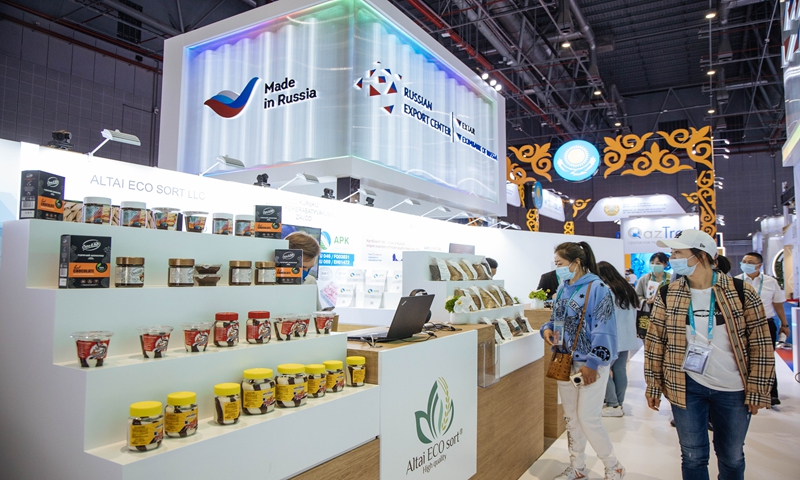
Visitors tour the Russian booth at the 4th CIIE on November 8, 2021. Photo: Li Hao/GT
Chinese and Russian officials are holding back-to-back talks on Wednesday and Thursday to further boost bilateral cooperation in various areas, including trade between Northeast China and the Russian Far East region, with businesses and industry insiders expecting increasing agricultural and energy trade amid close bilateral ties.
The increased talks between senior Chinese and Russian officials also come as bilateral economic and trade cooperation, while expanding rapidly in recent years, still face challenges such as the COVID-19 pandemic as well as rising interference from external forces like the US. Analysts said that enhanced talks will help address such challenges and boost bilateral trade.
Chinese Vice Premier Hu Chunhua on Wednesday co-hosted a meeting of the chairmen of the Intergovernmental Commission for Cooperation of Northeast China and the Far East and Baikal Region of Russia via video link, with Yury Trutnev, Russian deputy prime minister and presidential envoy to the Far Eastern Federal District of Russia, according to the Chinese Ministry of Commerce (MOFCOM).
China is willing to expand cooperation with Russia in agriculture and cross-border infrastructure, and explore new cooperation areas in green development and the low-carbon economy, while expanding coal trade, said Hu, noting that cooperation between Northeast China and the Russian Far East has had fruitful results.
Hu is also scheduled to co-chair the 25th session of the committee for regular meetings between Chinese and Russian heads of government with Russian Deputy Prime Minister Dmitry Chernyshenko on Thursday, the MOFCOM said.
While details of the meetings remain limited, businesses and analysts said that the two sides are likely focusing on boosting bilateral cooperation, including trade between Northeast China and the Russian Far East region. Some businesses are also expecting increasing agricultural and energy deals.
Agricultural and energy trade is active between China and the Far East region, with light industry cooperation one of the hot trends, Wang Yu, a project manager at the Russian-Asian Union of Industrialists and Entrepreneurs, a business group based in Moscow, told the Global Times on Wednesday.
"The main exports from Russia to China are soybeans, corn and wheat, whereas Russia imports vegetables from China," Wu said, adding that many enterprises from East China's Jiangsu and Zhejiang Provinces ship the parts of shoes and bags to an industrial park in Russia's Far East for final assembly.
The latest example was a shipment of 667 tons of Russian wheat imported by China's COFCO Corp through the Heihe port in Northeast China's Heilongjiang Province on October 19, which was the largest Russian wheat import since the 1990s, according to the Ministry of Commerce (MOFCOM). COFCO Corp is expected to import another 5,000 tons of Russian wheat in the near future.
In terms of energy, Wu said that his union helped import more than 20,000 tons of Russian coal to Mudanjiang in Heilongjiang in October. Another 40,000 tons of coal are expected to be imported by March 2022.
"We will draft new long-term contracts and start jointly developing coal deposits in Russia, including the Zashulanskoye coal deposit in the Trans-Baikal area," said Alexander Novak, Russian deputy prime minister, on November 17 during a China-Russia intergovernmental meeting.
Novak said that natural gas supplies from Russia to China have exceeded 12 billion cubic meters along the eastern route alone.
In the first half of 2021, trade between China and the Russian Far East stood at $5.82 billion, up 24 percent year-on-year. China remained the largest trading partner and largest source of foreign capital in the region, said MOFCOM spokesperson in September.
With a solid economic and trade foundation, trade between Northeast China and the Russian Far East is expected to expand, industry insiders said. Chinese industry insiders said COVID-19 is still a big obstacle for cooperation, and a better business environment in Russia is expected.
Zhang Dajun, chairman of Dongjin Group in Heilongjiang, one of the largest foreign owners of farms in Russia, said that the coronavirus hindered personnel exchanges and had a heavy impact on soybean shipments.
"Our agricultural planting area in Russia's Far East went down 70-80 percent from 2019, as no Chinese workers can work there," Zhang told the Global Times on Wednesday.
A source at Suifenhe port in Heilongjiang bordering Russia told the Global Times that only a small part of the logistics system is still operating. Truck drivers are not allowed to leave their vehicles and must return to the border within one day. Closed-loop management is strictly conducted.
Other food imports, such as frozen fish and sea cucumbers from Russia, have been greatly affected due to epidemic control of cold-chain shipments, Wu said.
Despite these issues, China and Russia are advancing their cross-border transport infrastructure facilities.
The Blagoveshchensk-Heihe highway bridge, the first highway bridge connecting China and Russia across the Heilongjiang River, is expected to open to traffic by the end of November. A cable car system linking the two cities is scheduled for completion in the second half of 2022, Russia Briefing reported.
The two countries are also pushing back against external inferences from the US, which seeks to prevent other countries from cooperating with China and Russia.
"Our US and certain European colleagues are running around the globe demanding an end to trade, economic, investment and defense industry cooperation with Russia and China. They are not even trying to hide it," said Russian Foreign Minister Sergey Lavrov on Monday, according to the Ministry of Foreign Affairs of Russia.
Zhao Lijian, spokesman of China's Foreign Ministry, said on Wednesday that what Lavrov said is sobering.
"Some countries with their allies abuse state power to politicize and ideologize economic and trade issues, which will not only undermine international trade rules, damage global supply chains and fragment global markets, but also harm others and themselves in the end," Zhao said during a daily briefing.




